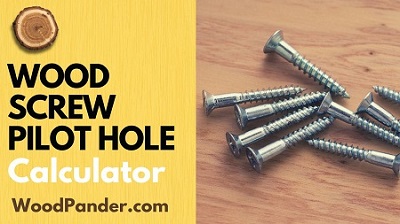The Screw Size Calculator is a tool that helps users determine the appropriate size of a screw based on its diameter and length. Simply enter the desired measurements and the calculator will provide the correct size. This tool is perfect for construction, woodworking, and DIY projects to ensure a secure fit and proper installation.
| Screw Size | Diameter (inches) | Length (inches) | Material | Recommended Use |
|---|---|---|---|---|
| #2 | 0.086 | 3/8, 1/2 | Wood | Light-duty |
| #4 | 0.112 | 1/2, 5/8 | Wood | Light-duty |
| #6 | 0.138 | 3/4, 1 | Wood/Metal | Medium-duty |
| #8 | 0.164 | 1, 1-1/4 | Wood/Metal | Medium-duty |
| #10 | 0.190 | 1-1/4, 1-1/2 | Wood/Metal | Medium-duty |
| #12 | 0.216 | 1-1/2, 1-3/4 | Wood/Metal | Heavy-duty |
| 1/4″ | 0.250 | 1-1/2, 2 | Wood/Metal | Heavy-duty |
| 5/16″ | 0.312 | 1-3/4, 2-1/2 | Wood/Metal | Heavy-duty |
| 3/8″ | 0.375 | 2, 2-1/2 | Wood/Metal | Heavy-duty |
| 1/2″ | 0.500 | 2-1/2, 3 | Wood/Metal | Heavy-duty |
One of our articles –Timber Log Volume Calculator.
What is a Screw Size Calculator?
Screw Size Calculator
A screw size calculator is a specialized tool that helps users determine the appropriate screw size for their specific needs.
It takes into account various factors such as material type, application, and specific requirements, and provides users with recommendations on the ideal screw size to use.
Screw size calculators can be standalone tools, online resources, or integrated features in other tools such as screw selection software or mobile apps.
Importance of Screw Size Calculators
Choosing the right screw size is crucial for the success and safety of any construction or DIY project. Using the wrong screw size can result in a host of issues, including damage to materials, weakened joints, or even project failure.
This is where screw size calculators play a vital role in ensuring the correct selection of fasteners. By taking into account various factors and providing accurate recommendations, screw size calculators help users avoid costly mistakes and ensure the optimal performance of their projects.
How Does a Screw Size Calculator Work?
Screw size calculators use a combination of mathematical formulas, engineering principles, and material specifications to determine the appropriate screw size for a particular application.
These calculators usually require users to input information such as the material type, application, load requirements, and other specific parameters.
Based on this input, the calculator processes the data and provides users with recommendations on the ideal screw size to use.
Types of Screw Size Calculators
There are several types of screw size calculators available in the market, catering to different needs and applications.
Some of the common appliance-specific, construction-specific, and general-purpose screw size calculators. Appliance-specific calculators are designed for specific applications, such as woodwork, metalwork, or electrical work, and provide recommendations based on the requirements of those applications.
Construction-specific calculators are tailored for construction projects, considering factors such as load-bearing capacity, material type, and structural integrity.
General-purpose calculators are versatile and can be used for a wide range of applications, making them a popular choice for DIY enthusiasts and professionals alike.
Using a Screw Size Calculator
Using a screw size calculator is typically straightforward. Users input the required parameters, such as material type, application, load requirements, and other specific details, into the calculator.
The calculator then processes the data and generates recommendations for the ideal screw size. Users can then choose the recommended screw size for their project, ensuring accurate and precise fastener selection.
It’s important to note that while screw size calculators are a valuable tool, double-checking the results and verifying the compatibility of the recommended screw size with the specific project requirements is still essential to ensure optimal results.
Factors to Consider When Choosing a Screw Size Calculator

When selecting a screw size calculator, there are several factors to consider to ensure its effectiveness and suitability for your needs.
Accuracy and Precision
The accuracy and precision of the screw size calculator are crucial to ensure reliable and consistent results. The calculator should use accurate mathematical formulas and engineering principles to generate recommendations, taking into account factors such as material type, load requirements, and application specifics.
Users should also verify the accuracy of the calculator’s results by cross-referencing them with other sources or consulting with industry experts.
User-Friendliness
The usability of the screw size calculator is also an important consideration. It should be easy to use, with a clear and intuitive interface.
Users should be able to input the required parameters easily, and the calculator should provide clear and understandable recommendations.
A user-friendly calculator saves time and effort and reduces the chances of errors in fastener selection.
Compatibility with Different Screw Types
Screws come in various types, such as wood screws, machine screws, self-tapping screws, and more, each with its own specifications and requirements.
The screw size calculator should be compatible with different types of screws, providing accurate recommendations for each type based on its specific parameters.
This ensures that the calculator can be used for various applications and materials.
Additional Features
Some screw size calculators may offer additional features that can enhance their usability and effectiveness. For example, some calculators may provide information on the recommended drill bit size or pilot hole size to use with the recommended screw size.
Others may offer customization options, allowing users to input their own parameters or requirements for more precise recommendations. Considering the availability of additional features can be beneficial in choosing the right screw size calculator for your needs.
Benefits of Using a Screw Size Calculator
Using a screw size calculator offers several advantages, making it an essential tool for both professionals and DIY enthusiasts.
Time and Cost Savings
Selecting the right screw size can be time-consuming, requiring manual calculations and research. A screw size calculator automates the process, saving time and effort in fastener selection.
Moreover, using the correct screw size ensures that materials and structures are not compromised, avoiding costly repairs or replacements in the long run.
Enhanced Efficiency and Precision
Screw size calculators provide accurate and precise recommendations, taking into account various factors that can affect fastener performance.
This ensures that the selected screw size is optimal for the specific application, enhancing the efficiency and effectiveness of the project.
Additionally, using the right screw size minimizes the chances of fastener failure, ensuring safe and reliable construction or DIY projects.
Common Mistakes to Avoid When Using a Screw Size Calculator
While screw size calculators are a valuable tool, there are some common mistakes that users should avoid to ensure accurate results:
Relying Solely on the Calculator
While screw size calculators provide recommendations based on various parameters, it’s essential to remember that they are not infallible.
Users should not solely rely on the calculator’s results and should always cross-verify them with other sources or consult with industry experts to ensure accuracy.
Factors such as material type, load requirements, and application specifics can vary, and it’s important to consider all relevant factors in fastener selection.
Not Verifying Compatibility
Screw size calculators may provide recommendations for specific screw types, but it’s crucial to verify the compatibility of the recommended screw size with the specific project requirements.
Factors such as material type, thickness, and load requirements can affect the suitability of a screw size. Users should always double-check the compatibility of the recommended screw size with the specific application to avoid issues such as insufficient holding power or damage to materials.
Neglecting Other Factors
While screw size is an essential consideration, it’s not the only factor to consider in fastener selection. Users should also take into account other factors such as screw length, head type, and drive type, as they can impact the overall performance and stability of the fastener. Neglecting these factors can result in suboptimal results and compromise the integrity of the project.
Not Considering Safety Factors
Safety should always be a top priority in any construction or DIY project. When using a screw size calculator, users should also consider safety factors such as load-bearing capacity, structural integrity, and environmental conditions.
Using an undersized or inadequate screw size can result in fastener failure, compromising the safety and stability of the structure.
Overlooking Project-Specific Requirements
Every construction or DIY project has unique requirements, and users should consider these requirements when using a screw size calculator.
Factors such as material type, project location, and project specifications can affect the suitability of a screw size.
Users should not overlook these project-specific requirements and should ensure that the recommended screw size aligns with the project’s needs for optimal results.
See Also Pilot Hole Calculator for Screws.
Related Questions About Screw Size Calculator
What is a screw size calculator?
A screw size calculator is a tool that helps determine the appropriate screw size for a particular project.
How does a screw size calculator work?
A screw size calculator works by inputting information such as material type and thickness, and calculating the appropriate screw size based on that data.
What are the benefits of using a screw size calculator?
The benefits of using a screw size calculator include increased accuracy and efficiency, as well as reducing the risk of damaging materials or tools.
Can a screw size calculator be used for both wood and metal screws?
Yes, a screw size calculator can be used for both wood and metal screws.
Is it necessary to use a screw size calculator, or can I just estimate the screw size I need?
While it is possible to estimate screw size, a screw size calculator provides a more accurate and reliable solution.
Are screw size calculators accurate?
Screw size calculators are generally accurate, but it’s important to double-check with a physical screw size chart or a hardware specialist to ensure correctness.
How do I know if I’m using the right screw size?
If the screw is secure and does not cause any damage to the material or surrounding area, then it is likely the right size.
Can a screw size calculator help me choose the right length and diameter of a screw?
Yes, a screw size calculator can help determine the appropriate length and diameter of a screw based on the project requirements.
Can a screw size calculator be used for non-standard or custom screws?
It depends on the screw size calculator; some can be used for non-standard or custom screws, while others are only intended for standard screw sizes.
How do I use a screw size calculator?
To use a screw size calculator, input information such as material type and thickness, and the calculator will provide the appropriate screw size.
Is a screw size calculator easy to use for beginners?
Many screw size calculators are designed to be user-friendly, even for beginners.
Can a screw size calculator help me avoid damaging my materials or tools?
Yes, using a screw size calculator can help prevent damage to materials or tools by ensuring the correct screw size is used.
Are there any disadvantages to using a screw size calculator?
One potential disadvantage of using a screw size calculator is relying solely on the tool without double-checking with a hardware specialist or physical screw size chart.
Can a screw size calculator help me determine the optimal torque for a screw?
Some screw size calculators may also provide recommendations for torque settings based on the screw size and material.
Can a screw size calculator be used for load-bearing applications, such as construction or furniture assembly?
Yes, a screw size calculator can be used for load-bearing applications, but it’s important to consult with a professional to ensure safety and reliability.
Conclusion
In conclusion, a screw size calculator is a valuable tool for accurate and precise fastener selection. By considering factors such as accuracy, user-friendliness, compatibility with different screw types, and additional features, users can choose a reliable screw size calculator that meets their needs.
Avoiding common mistakes such as solely relying on the calculator, not verifying compatibility, neglecting other factors, not considering safety factors, and overlooking project-specific requirements can help ensure accurate and reliable results in fastener selection.
With the right approach and attention to detail, a screw size calculator can greatly enhance the efficiency and effectiveness of construction and DIY projects.
Sources:
https://www.sciencedirect.com/science/article/pii/S0169260716305806








